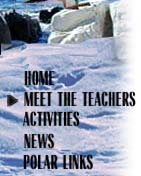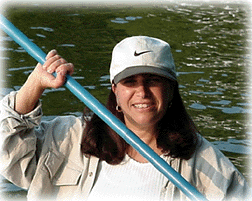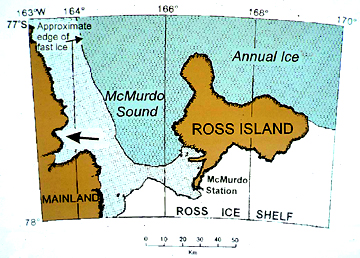
|
|





Please do not send images or attachments in messages to Tina. The field site cannot support large e-mail messages.

Hi, my name is Tina King. I teach fourth grade at West Elementary in
Mt. Juliet, Tennessee (near Nashville) for the Wilson County Schools. Over the past twenty years, I have taught grades K through 6, including Title I Math and Reading. I have found that over the years, my travel has allowed me the opportunity to share experiences with my students, whether it involved rafting the Grand Canyon, living with families in Europe, or snorkeling in a volcano. My goal is to help my students to see the possibilities within themselves, as well as to make connections in their learning. I feel that my students need to see their teacher learning in order to realize that learning doesn't end when they walk out of the classroom. Learning is exciting, and it should be seen as a life-long process. I've always loved learning, but a trip I took in 1997 changed my level of wanting to learn, and it enabled me to become a "true learner". My goal is to help my students go through this inquiry process, too, by having them practice real science, develop skills, and believing that they can reach beyond the boundaries that people set for them, or that they set for themselves.
Three years ago, my family and I went out with nine guides to hunt for fossils and minerals, as well as went on two dinosaur digs. When I arrived back home on the 55th day, I realized that I would never be the same teacher or person again. As I brushed away the earth and saw the dinosaur bones emerge, I realized that this is "how" I wanted my students to feel about learning. It was no longer about the dinosaur bones, but rather the need to learn more. I have found that my need to learn has pushed me beyond my comfort zone at times. Last year, despite my anxiety, I received my scuba certification in order to study the ocean. I am so thankful that I then had the opportunity to go to Belize, Central America, to do four dives, including a night dive. I will never forget seeing the many things that I had read about in my marine biology book. When I went to Alaska, I experienced glaciers first-hand by walking on them, flying over them, or taking boat rides to them. In this way, I could help personalize our study of glaciers for my students, as well as for myself. My goal is to change my students' views on science and learning. I feel that I only have one year to make a difference in my students' lives, and hopefully I will help them make the connections that will help change the way they learn, not just for that year, but for the rest of their lives.
In my own life, many wonderful people have influenced me along the way. My parents and grandparents taught me to value education as a gift, and to work hard at all that I do. Other educators and professional development have made a major impact on my teaching. My two sons, now 20 and 17, both have helped make me a better person and learner. Many times, especially during our travels, they have helped me see things through their eyes. We have shared many experiences that have bonded our family together. I feel that my husband, Bob, has been my greatest teacher. I have found him to be the ultimate teacher, the "unsung hero" because he encourages growth in others. He gave me my love for science, despite the fact that science was my least favorite subject in high school and college. Who would have ever known that I would one day become a member of a research team going to Antarctica? We only have one life, and it begins by our constant search for learning and stretching our own boundaries. I feel that in order to give the most to my students and to share with others, I must first experience growth within myself. In return, I only hope that in some small way, I can touch their lives the way they've touched mine.
Thanks to the Dell Corporation for their generous support in providing a
laptop computer and video digital camera in order to share this Antarctic
experience with others.

A special thank you to PASCO Scientific for providing scientific equipment to conduct experiments in the field.
Thank you to the West Elementary faculty and staff for providing film for
this Antarctic expedition. The love and support have encouraged my growth
and learning!
American Federation of Mineralogical Societies

Seasonal Dynamics of Giant Agglutinated Foraminifera
Dr. Samuel S. Bowser
Wadsworth Center, New York State Department of Health
Albany, New York
The focus of this research will be a seasonal study of the large, single-celled organisms known as agglutinated foraminifera ("forams"). These dominant one-celled protozoans are found in abundance at the bottom of Explorers Cove, a shallow-water embayment on the western side of McMurdo Sound, Antarctica. This area is one of the few places on Earth where scuba divers have access to a region that resembles the deep ocean floor. The divers will scuba under 15-feet of ice to collect foram specimens from the bottom of these Antarctic waters to study changes over time. In the past, these studies have been restricted to specimens collected in October, November, and early December. During this field season, the research will be extended through February in order to document Austral spring to late-summer changes. Due to the unique characteristics and scuba accessibility to the sea floor, Dr. Bowser has parcticipated in a series of on-going investigations and research at Explorers Cove since 1984.
Check out Dr. Bowser's lab site at: http://www.bowserlab.org.
Along with traditional sediment coring and microscopic sorting methods, fine-scale changes will be noted by utilizing underwater microscopy equipment. These combined approaches will lead to a more complete understanding of the roles played by larger agglutinated forams in the Explorers Cove benthic food web, as well as to any changes in response to available food sources. Because Explorers Cove and its agglutinated foram assemblage are closely comparable to many deep-sea localities, the results of these studies will have a wide significance in the ocean sciences.
Although, I am certified as a scuba diver, I am not certified for these extreme conditions. I will be working with the specimens at the surface. In relation to this project, I will also be doing a study of one of the southern-most "saltwater marshes" on Earth. Unlike the marshes we are familiar with, which have cattails and sawgrass, these Antarctic "saltwater marshes" are inhabited by mats of photosynthetic microbes. By using a data logger to collect information on temperature, pH, dissolved oxygen, and salinity, we hope to determine how the organisms that live within this marsh respond to seasonal changes.
McMurdo Weather from Yahoo: http://weather.yahoo.com/forecast/McMurdo_AA_c.html.

Polar Classroom Activities:
Cold Hard Facts... What Inquiring Minds Will Know
 Tina is working at a remote field site and often will be able to send only journal text. She may send images via occasional helicopter transport and will post more when she returns home. Be sure to check Tina's journals for picture updates.
Tina is working at a remote field site and often will be able to send only journal text. She may send images via occasional helicopter transport and will post more when she returns home. Be sure to check Tina's journals for picture updates.
June 2002
| Su |
Mo |
Tu |
We |
Th |
Fr |
Sa |
| -- |
-- |
-- |
-- |
-- |
-- |
1 |
| 2 |
3 |
4 |
5 |
6 |
7 |
8 |
| 9 |
10 |
11 |
12 |
13 |
14 |
15 |
| 16 |
17 |
18 |
19 |
20 |
21 |
22 |
| 23 |
24 |
25 |
26 |
27 |
28 |
29 |
| 30 |
-- |
-- |
-- |
-- |
-- |
-- |
December 2001
November 2001
October 2001
| Su |
Mo |
Tu |
We |
Th |
Fr |
Sa |
| -- |
1 |
2 |
3 |
4 |
5 |
6 |
| 7 |
8 |
9 |
10 |
11 |
12 |
13 |
| 14 |
15 |
16 |
17 |
18 |
19 |
20 |
| 21 |
22 |
23 |
24 |
25 |
26 |
27 |
| 28 |
29 |
30 |
31 |
-- |
-- |
-- |
June 2001
| Su |
Mo |
Tu |
We |
Th |
Fr |
Sa |
| -- |
-- |
-- |
-- |
-- |
1 |
2 |
| 3 |
4 |
5 |
6 |
7 |
8 |
9 |
| 10 |
11 |
12 |
13 |
14 |
15 |
16 |
| 17 |
18 |
19 |
20 |
21 |
22 |
23 |
| 24 |
25 |
26 |
27 |
28 |
29 |
30 |
August 2000
| Su |
Mo |
Tu |
We |
Th |
Fr |
Sa |
| -- |
-- |
1 |
2 |
3 |
4 |
5 |
| 6 |
7 |
8 |
9 |
10 |
11 |
12 |
| 13 |
14 |
15 |
16 |
17 |
18 |
19 |
| 20 |
21 |
22 |
23 |
24 |
25 |
26 |
| 27 |
28 |
29 |
30 |
31 |
-- |
-- |
Return to top of page
|
